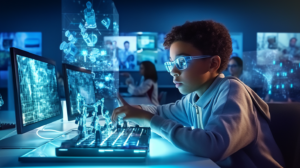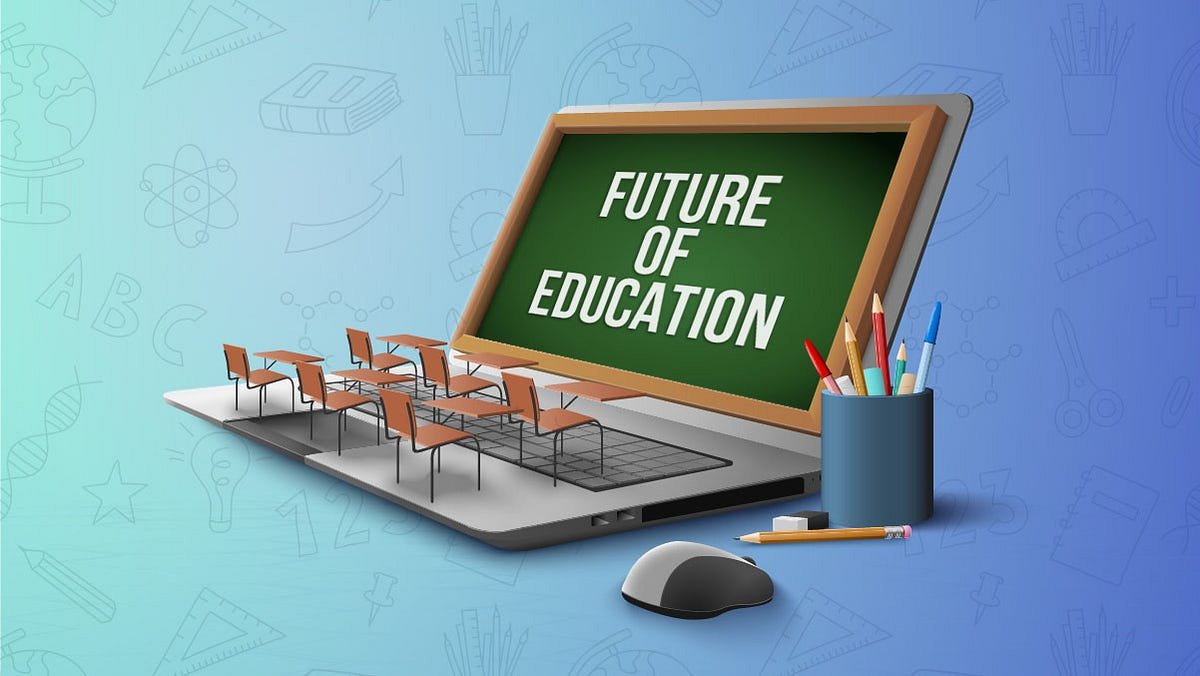the Future of Education promises a dynamic and engaging learning experience for students of all ages. The education sector is undergoing a period of significant transformation. Driven by technological advancements, evolving societal needs, and a growing emphasis on personalized learning, This article explores some of the most prominent trends and innovations shaping this exciting new landscape.
Revolutionizing Teaching and Learning
Technology plays a central role in the Future of Education. Digital tools, online platforms, and educational apps are transforming classrooms and reshaping the way students learn. From interactive whiteboards and learning management systems to online courses and educational games, technology empowers educators to create engaging and interactive learning experiences.
Emerging technologies like Artificial Intelligence (AI), Virtual Reality (VR), Augmented Reality (AR), and machine learning are further pushing the boundaries of education. AI-powered tutors can personalize learning paths, VR simulations can immerse students in historical events, and AR can overlay digital information onto the real world, fostering deeper understanding and engagement.
Read also: Research And Creative Work In Graduate Education
Tailoring Education to Individual Needs
A defining feature of the Future of Education is the shift towards personalized learning approaches. This student-centric model acknowledges that each learner has unique needs, preferences, and learning styles.
Adaptive learning algorithms, powered by data analytics, can tailor learning materials, adjust instruction based on student performance, and provide targeted support to bridge knowledge gaps. Personalized learning platforms empower students to take ownership of their learning journey, fostering deeper engagement and improved academic outcomes.

Blended Learning and Hybrid Models
The traditional classroom setting is evolving. The Future of Education embraces blended learning models that seamlessly integrate face-to-face instruction with online learning modalities. This approach offers greater flexibility, allowing students to learn at their own pace and revisit materials as needed.
Online learning platforms provide access to a vast array of interactive content, simulations, and collaborative tools, enriching the learning experience beyond the confines of the classroom. Blended learning empowers educators to personalize instruction, cater to diverse learning styles, and promote self-directed learning.
Project-Based and Experiential Learning
The Future of Education emphasizes the importance of equipping students with essential 21st-century skills. Project-based and experiential learning methodologies offer effective ways to cultivate critical thinking, problem-solving, collaboration, and communication skills.
By engaging in real-world projects, collaborating with peers, and applying knowledge to solve problems, students develop a deeper understanding of concepts and a thirst for lifelong learning. From building robots to participating in mock trials, innovative project-based learning initiatives create a stimulating learning environment that prepares students for the challenges and opportunities of the future workforce.

Read also: Secondary Education Research Topics
Lifelong Learning and Continuing Education
The rapid pace of technological advancements and the ever-evolving job market necessitate a shift towards lifelong learning in the Future of Education. Gone are the days of formal education ending after graduation.
Online courses, micro-credentials, and specialized training programs provide educators and learners alike with accessible and affordable opportunities to continuously update their skills and knowledge. This shift towards lifelong learning empowers individuals to stay competitive in a dynamic job market and pursue their passions throughout their lives.
Fostering Continuous Development
Educators play a pivotal role in shaping the Future of Education. To effectively utilize emerging technologies and implement innovative teaching methods, educators themselves require ongoing training and professional development.
Online courses, workshops, coaching and mentoring programs, and collaborative learning communities provide educators with the tools and support they need to integrate technology seamlessly into their teaching practices, personalize learning experiences, and ensure that all students thrive in the evolving classroom of tomorrow.
Ensuring Access and Equity in Education
Technology has the potential to revolutionize education, but it’s crucial to address the digital divide and promote equity in the Future of Education. Initiatives such as open educational resources (OER), which provide free and readily available learning materials, are essential for ensuring all students have access to quality education.
Additionally, digital literacy programs can equip learners with the skills they need to navigate the online learning landscape. Further, educators must embrace inclusive teaching practices that cater to diverse learning styles and backgrounds, fostering a classroom environment where all students feel valued and supported.
Fostering Intercultural Competence
Globalization is transforming education, and the Future of Education embraces international collaborations, cross-cultural exchanges, and global learning networks. Students are increasingly exposed to diverse perspectives and ways of thinking through online discussions, virtual exchanges, and international study programs.
This fosters intercultural competence, global citizenship, and the ability to thrive in a diverse and interconnected world. Preparing students for a globalized future requires equipping them with the skills to understand and appreciate different cultures, collaborate effectively with individuals from varied backgrounds, and address global challenges collectively.
Frequently Asked Questions about the Future of Education
Will technology replace teachers?
Educators will remain central figures in the Future of Education. Technology will serve as a powerful tool to enhance their teaching, personalize learning, and provide students with diverse learning experiences. Teachers will evolve into facilitators, guides, and mentors, fostering critical thinking, creativity, and social-emotional skills in their students.

How can parents prepare their children for the Future of Education?
Parents can nurture their children’s curiosity, encourage exploration and experimentation, and instill a love for lifelong learning. Expose them to technology responsibly, promote digital literacy skills, and encourage collaboration and communication. By fostering these qualities, parents can equip their children to thrive in the dynamic learning environment of the future.
Is the Future of Education affordable and accessible to everyone?
Ensuring equitable access to quality education in the Future of Education requires a concerted effort. Initiatives like open educational resources and digital literacy programs can bridge the digital divide. Additionally, promoting inclusive teaching practices and providing support for students from diverse backgrounds are crucial for creating a truly accessible learning environment.
Read also: Impact of Studying Abroad on Career Preparation
What skills will be most important in the Future of Education?
The Future of Education emphasizes the development of 21st-century skills, including critical thinking, problem-solving, collaboration, communication, creativity, adaptability, and digital literacy. Students who can effectively learn, adapt, and innovate will be well-prepared to navigate the ever-changing world of tomorrow.
The Future of Education is brimming with exciting possibilities. By embracing new technologies, innovative pedagogies, and a commitment to lifelong learning, we can create a learning environment that empowers all students to reach their full potential. The key lies in fostering a spirit of curiosity, collaboration, and critical thinking, preparing students not just for standardized tests but for the complex challenges and opportunities of the 21st century.
As lifelong learners ourselves, educators, policymakers, and learners alike must stay informed about emerging trends, adapt to the changing landscape of education, and work together to ensure inclusive and equitable access to a quality education for all. The future of education is bright, and by embracing innovation and a commitment to continuous learning, we can unlock a world of possibilities for generations to come.
Read also: University of Waikato | Reviews and Programs
Trust you found our article on “The Future of Education: A Glimpse into a Transformed Learning Landscape” helpful. follow our website for more exciting and informative Articles like this.
